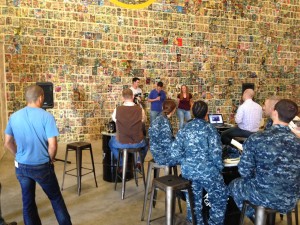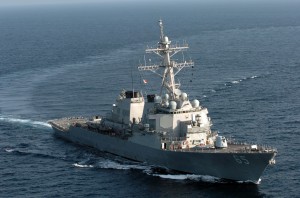Events Week of 20-26 October 2013
21 October 2013 – Washington, DC – Center for Strategic and International Studies – “The Future of the Marine Corps”. Following a decade at war and amidst mounting fiscal pressures, the Marine Corps is developing a new force structure designed to address the “new normal” security environment while maximizing scarce resources. The Corps has already designed and deployed new crisis response capabilities in response to existing security gaps, and is making additional adjustments to help enhance its ability to contribute to joint shaping and combat capabilities going forward. Join us for a discussion with Major General Frank McKenzie, USMC Representative to the Quadrennial Defense Review, for a look at how these adjustments relate to broader questions being explored as part of the Quadrennial Defense Review, as well as to the Corps’ future priorities.
21 October 2013 – Washington, DC – Center for Strategic and International Studies – “Rare Earth Elements: Implications on US-Asia Environmental and Security Issues”. Rare Earth Elements (REEs) are chemical elements that are critical for your mobile phones, laptops, green technologies, and even defense systems. Despite the fact that REEs are more abundant than silver and gold with known reserves in Australia and the U.S., China continues to monopolize global REE supplies, which could negatively impact the national security interests of other countries. Countries such as Japan, which accounts for two-thirds of China’s REE exports and relies on its supply to fuel its automotive and electronics industries, have argued that China’s monopoly over REEs are dangerous, as China can and has imposed trade embargos on REEs to gain political leverage. This roundtable, featuring many prominent speakers, will focus on pressing questions such as: Is China using REEs to gain geopolitical advantage, or is it genuinely concerned about environmental challenges of REE production? What does the current state of REE production imply for the economies and security interests of Japan, other Asia-Pacific countries, and the U.S.? And what can be done to mitigate China’s dominance of mining REEs?
22 October 2013 – London – King’s College – “Afghan Question and the Role of Pakistan’s Military Establishment”. As Afghanistan undergoes a historic political and security transition with the withdrawal of US-led Coalition forces, the role of Pakistan becomes ever more important. Facing unprecedented domestic security challenges, the Afghan situation looms large in Pakistan’s strategic outlook. The speaker, an expert on the Pakistani military establishment and Islamic world’s strategic affairs provides insight on how the Pakistani army and intelligence is currently debating the Afghan question. He is the founding director of IISA.
22 October 2013 – Washington, DC – Hudson Institute – “Power Shifts in the Eastern Mediterranean: The Emerging Strategic Relationship of Israel, Greece, and Cyprus”. The discovery of massive quantities of hydrocarbons in both the Israeli and Cypriot exclusive economic zones, and the selection of the Trans Adriatic Pipeline, redraws the region’s hydrocarbon map and will significantly impact energy security policies. This transformation has emerged as large political upheavals continue throughout the area. Primary topics of discussion will be: 1) the emerging strategic relationship of Israel, Greece, and Cyprus; 2) changes in the region’s energy security environment; and 3) Turkey’s reorientation toward Islamism and the East.
22 October 2013 – London – International Institute for Strategic Studies – “Recent Operations in Helmand”. NATO and the Afghan government are focused on achieving full Afghan leadership of security across the country by the end of 2014, when NATO’s combat mission will end. This security transition requires NATO and Kabul to increase the size and capability of Afghan forces, develop the capacity of the Afghan state, reduce corruption and persuade ‘reconcilable’ insurgents to lay down their arms.
At the end of June, the Afghan government and NATO announced ‘Milestone 13’, marking a significant increase in Afghan leadership of security operations. Security in Helmand is now the full responsibility of the Afghan authorities. The British Army’s 1st Mechanized Brigade has just returned from there. Its commander, Brigadier Rupert Jones, will describe the developing capabilities of the Afghan security forces and the brigade’s role in supporting them.
22 October 2013 – Washington, DC – Stimson Center – “Securing the Nuclear Enterprise: What Nuclear Crises Teach Us About Future Security Threats”. Next spring, the U.S will join other world governments and organizations in The Hague for the 2014 Nuclear Security Summit. Like previous gatherings in 2010 and 2012, the upcoming summit will include debate about the steps the global community must take to prevent nuclear materials from falling into the hands of non-state actors. Central to this objective is the ability of nuclear armed states to maintain control over their weapons and sensitive materials. One way the U.S. can identify existing gaps in the control regime and prepare for the summit is by carefully studying previous nuclear weapons crises.
During its Cultural Revolution, China nearly lost control of its nuclear arsenal. This history – little known in the U.S. – is both chilling and critical to understanding Chinese attitudes towards nuclear security. In the Nonproliferation Policy Education Center’s (NPEC) new study, Nuclear Weapons Security Crises: What Does History Teach?, Chinese nuclear weapons management expert and Executive Director of Project 2049 Institute Mark Stokes tells the story of China’s near-nuclear crisis and the lessons that can be learned from it.
23 October 2013 – Washington, DC – Atlantic Council – “Cyber Risk Wednesday”. Cyber Risk Wednesdays brings cyber experts from government and industry together with policymakers to examine topics at the core of the Cyber Statecraft Initiative’s study of interrelated cyber hazards and underlying concentration of risks. The series is designed to expose stakeholders from the technology, policy, and risk management communities to vibrant new cyber topics and provide a venue for the exchange of ideas.
The launch event, held on October 23, will introduce the joint effort by the Atlantic Council and Zurich Insurance to understand how global aggregation of cyber risks could cause systemic shocks and ways, such as insurance and resilience, to mitigate them. A moderated discussion will analyse systemic cyber risks and explore their implications on the future of the internet. The panel will feature Larry Castro, Managing Director at The Chertoff Group, whose prior government service includes over four decades at the National Security Agency.
24 October 2013 – London – International Institute for Strategic Studies – “Prompt Global Strike”. Today, only nuclear-armed ballistic missiles are capable of striking targets at intercontinental range within minutes. Conventionally-armed aircraft or subsonic cruise missiles could take many hours to travel the same distance. A number of states are, however, seeking to close this ‘capability gap’ by developing hypersonic long-range conventional weapons. The United States’ Conventional Prompt Global Strike programme is the most well-known example. However, China is also very active in this area and efforts in Russia also appear to be underway. James Acton will explore the implications – both positive and negative – of these weapons for international security, and especially nuclear deterrence.
24 October 2013 – Santa Monica, CA – RAND Corporation – “Security Versus Privacy?”. Does homeland security mean you can’t be secure in your own home? A steady drumbeat of revelations about the U.S. government’s trove of phone and electronic communication records of private citizens has unsettled many within the past few months. The government has argued that it needs this information to identify and apprehend terrorists and their sympathizers. But people are wondering if America is sacrificing privacy and civil liberties upon the altar of homeland security, and if so, to what extent? Are the fears of an oncoming police state grossly unjustified? Or should they serve as clarion calls for reform? Join us in discussing where to draw the proper lines between privacy, security, and liberty.
25 October 2013 – London – King’s College – “Conventional Prompt Global Strike: What Happens When Technology Overwhelms Strategy”. James Acton is a senior associate in the Nuclear Policy Program at the Carnegie Endowment for International Peace. He is a member of the Trilateral Commission on Challenges to Deep Cuts and co-chaired the Next Generation Working Group on US-Russia arms control. Acton, who holds a PhD in theoretical physics, was previously a lecturer in the Department of War Studies at King’s College London.
25 October 2013 – Washington, DC – Cato Institute – “Dangerous World? Threat Perception and U.S. National Security.” Last year, Chairman of the Joint Chiefs of Staff Gen. Martin Dempsey contended that “we are living in the most dangerous time in my lifetime, right now.” This year, he was more assertive, stating that the world is “more dangerous than it has ever been.”
Is this accurate? At this conference, experts on international security will assess, and put in context, the supposed dangers to American security. Speakers will examine the most frequently referenced threats, including wars between nations and civil wars within nations. Panelists will also discuss the impact of rising nations, weapons proliferation, general unrest, transnational crime, and state failures, as well as technological developments, climate change, and the requirement to maintain a stable global economic system.
26 October 2013 – Washington, DC – Georgetown / TED Talks – “TEDx Talk”. The professors giving talks are not just experts in their field of academia- they have achieved great feats beyond the classroom. Sonal Shah worked as Deputy Assistant to the President and Director of the first White House Office of Social Innovation and Civic Participation, while Dr. Francis Slakey is the first person in history to both summit the highest mountain on every continent and surf every ocean in the world. For more information on our full list of speakers visit www.tedxgeorgetown.com
For the second independently organized TEDxGeorgetown event, the focus is on student engagement. Through a brief application, select students will have the opportunity to interact with the speakers in an intimate group setting. Tickets are free of charge.
Long-Term
29 October 2013 – Washington, DC – Disruptive Thinkers. Execution is the new innovation. All of our innovative ideas won’t amount to much if we can’t find a way to implement them. And this month we get a chance to hear from Rob Holzer, someone who knows how to do just that.
29 October 2013 – Washington, DC – Atlantic Council – “Regional Cooperation: An Imperative for Transatlantic Defense”. Please join the Atlantic Council for an address by, and discussion with, Finnish Minister of Defense Carl Haglund, who will detail the importance of regional cooperation for transatlantic security.
Building on the successes of Nordic Defense Cooperation (NORDEFCO), Minister Haglund will make a case for NATO member and partner countries to follow a similar framework to sustain present-day interoperability levels and enhance military capabilities. NORDEFCO’s five members states—Finland, Denmark, Iceland, Norway, and Sweden—use regional networking to increase their interoperability via cross-border cooperation, build-up and maintain necessary military capabilities, and provide cost-effective contributions to international efforts.
30 October 2013 – London – King’s College – “Geographic Information Systems and the Geographies of War”.
30 October 2013 – Washington, DC – Foreign Policy Association – “Georgetown Conference: Iran and the South Caucasus”.
31 October 2013 – London – King’s College – “Terror Attacks on Energy Infrastructure – A Growing Threat?”. The European Centre for Energy and Resource Security (EUCERS) cordially invites you to the fifth and final roundtable discussion in a series on Resilient Energy Infrastructure co-hosted by acatech – National Academy of Science and Engineering, Germany and the Konrad-Adenauer-Foundation in London, in partnership with KPMG.
31 October 2013 – Washington, DC – CNA – “Asia’s Looming Hotspot”. Rear Admiral Michael McDevitt, U.S. Navy (Ret.) will discuss the increasingly contentious dispute between China and Japan concerning sovereignty over the Senkaku/Diaoyu Islands in the East China Sea and the implications this dispute has for U.S. foreign policy. This talk is one of a series on “Hidden Dangers: Emerging Global Issues of the 21st Century” sponsored with the World Affairs Council of Harrisburg, Pennsylvania. – See more at: http://www.cna.org/news/events/2013-10-31#sthash.cBXbR5bq.dpuf
01 November 2013 – Washington, DC – Atlantic Council – “Tackling India’s Cyber Threat”. India is becoming the second-largest victim of cyberattacks after the United States and earlier this year released its first national Cyber Security Policy. The purpose of this framework document is to ensure a secure and resilient cyberspace for citizens, businesses, and the government.
In particular, the policy aims to strengthen the role of the Computer Emergency Response Team (CERT-In) in coordination with crisis management efforts and awareness-raising activities on cybersecurity. Alongside protecting the country’s cyber infrastructure, the policy strengthens the significant role IT has played in transforming India’s image to that of a global player in providing IT solutions of the highest standards.
11 November 2013 – London – King’s College – “New Nuclear Initiatives in Arms Control and Nonproliferation – Likelihood of Success?”. President Obama’s renewed commitment to ‘a world without nuclear weapons’ along with ongoing challenges over Iran, North Korea, and within the Nuclear Non-Proliferation Treaty, have given rise to numerous new initiatives in arms control and nonproliferation. A panel will discuss four such initiatives, including the humanitarian impacts of nuclear weapons initiative, the ‘P5 process’ with the five NPT-recognized Nuclear Weapon States, US-Russia arms control, and developments in Chinese nuclear policy.
13 November 2013 – Washington, DC – 10th Annual Disruptive Technologies Conference (Postponed)
14 November 2013 – India – The Diplomat – “International Conference on Future Challenges in Earth Sciences for Energy and Mineral Resources”.
16 November 2013 – India – The Diplomat – “Global Maritime International Conference”.
10 December 2013 – Washington, DC – USNI – 2013 Defense Forum Washington: Shaping the New Maritime Strategy and Navigating the Budget Gap Reality.
 endorsement, all descriptions are the events’ own. Think of one we should include? Email Grant at operations@cimsec.org.
endorsement, all descriptions are the events’ own. Think of one we should include? Email Grant at operations@cimsec.org.


